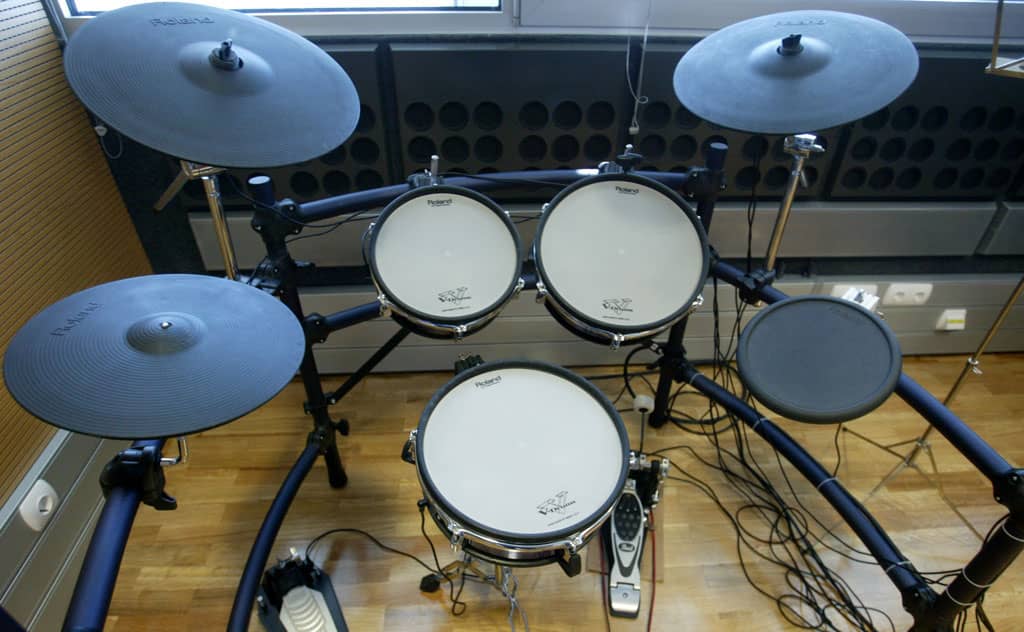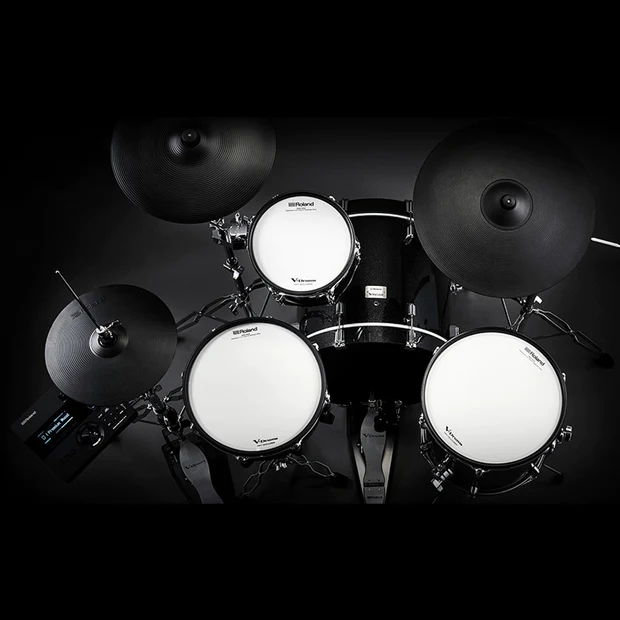© All rights reserved Copyright 2024
Introduction:
When buying a drum kit, acoustic and electronic drums are your two options. Acoustic drums are the most popular, and they’re what you generally see drummers playing in live gigging settings.
Electronic drums are softer pads that have electronic triggers to produce digital sounds. They’re mostly used for quieter practicing, but they can be used for live performances as well.
If you’re wondering whether electronic drums are good for beginners, keep reading. We’re going to break down everything you need to know as a beginner and why starting with an electronic drum kit may or may not be a good idea.
Are Electronic Drum Kits Good for Beginners
Table of Contents
Toggle
Learning Curve
Drumming isn’t the easiest skill to learn, whether you’re playing an acoustic kit or an electronic kit. However, there are a few differences between learning on an electronic kit compared to an acoustic one.
Electronic kits don’t give you the same physical feedback that acoustic kits do. You don’t feel the bass drum in your body when playing, and going from an electronic kit to an acoustic kit after that may feel quite weird.
Acoustic drums need to be played loudly, whereas electronic drums don’t. That’s something else you’ll need to learn when transferring over to an acoustic kit. You may find that you hit the drums too softly.
Lastly, most electronic drum kits are a lot smaller than acoustic drum kits. If you’re used to playing on smaller pads, switching to large drums may take some time to get used to.
PROS: THINGS WE LIKED
- No noise constraints
- Multiple high-quality drum sounds to pick from
- Easy to record
- Smaller than acoustic kits
- Beginner electronic kits are cheaper than beginner acoustic kits
CONS: THINGS WE DIDN'T LIKE
- The responsiveness of the drums isn’t the same, especially with affordable e-kits
- Electronic kits are more likely to get damaged or stop working
- Switching over from an electronic kit to an acoustic kit will be difficult

Feel and Response Depending on the Quality of Drums
The unfortunate aspect of electronic drum kits is that they only start feeling very resemblant to acoustic kits when their cost is higher.
Even the most expensive electronic drum kits on the market don’t feel exactly like acoustic kits, but they come the closest.
Acoustic drums are what drumming is all about, so electronic drums are used mostly as practice tools or options to use where acoustic drums won’t work.
Because of this, it’s ideal to play on an electronic kit that feels similar to acoustic drums. For that, you need to pay lots of money.
So, beginner drummers should settle on beginner electronic drum kits and accept that they don’t feel the same. They have the same sounds, but the feedback you get when playing the pads will be very different from playing real drums and cymbals.
If you’re a beginner with a high budget, then you should get a mid-level or professional electronic drum kit. Those will feel a lot better to play.
FAQ:
Should beginners use electronic drums?
Ideally, beginners should use acoustic drums. You’ll get the most authentic drumming experience from acoustic drums, and you’ll use acoustic drummers for 99% of all the gigs you may end up playing.
However, using acoustic drums isn’t a possibility for everyone. Some drummers aren’t able to make loud noises where they live.
Other drummers simply can’t afford to get a full acoustic set with hardware and cymbals, whereas a cheap electronic drum kit that comes with a throne, sticks, and a bass pedal is easily attainable.
If a beginner isn’t able to use an acoustic kit, they should use an electronic kit. They should just try their best to play on acoustic kits whenever they can, though. It’s important to develop the skills you learn from playing on an acoustic drum set.
Can you learn drums on electronic drums?
Yes, you can learn to play drums on an electronic drum set. You can play the same fundamental rhythms and use the same techniques.
However, there will be a few things that you can’t learn on inexpensive electronic kits. Some electronic kits don’t have the ability to play cross-sticks, cymbal bells, and other varied dynamic notes.
To be able to learn those drumming skills, you need to learn on an expensive electronic drum set.
Are electronic drums easier?
Electronic drums are slightly easier to learn than acoustic drums. You get more rebound from the pads, making it easier to play fast patterns.
They’re also a lot smaller than acoustic kits, making it easier to reach all around the kit when playing.
However, we wouldn’t say that they’re a lot easier, as learning on an electronic kit still requires plenty of coordination and time-keeping.
Which drums are good for beginners?
Any drum kit that is considered entry-level is good for beginners. Beginner drummers won’t have any gear at the beginning, so they need to get a drum kit that comes with drums, cymbals, and hardware.
Electronic drum kits always have all the drums and cymbals you need. You sometimes need to buy headphones, a drum pedal, and a throne separately.
Conclusion
To wrap things up, yes, electronic drum kits are good for beginners. They’re a lot more affordable than acoustic kits, they allow you to play at all times of the day without bothering anyone, and they give you plenty of sound options to play around with.
However, beginner drummers should only use an electronic kit if using an acoustic kit isn’t an option. Acoustic drums are much better to learn on, as acoustic drums are the main instrument that drummers play.
If you want to play gigs or record songs in studios, you’ll need to be good at playing acoustic drum kits. Learning on an electronic drum kit and then switching to an acoustic kit is a difficult process. So, you should start with an acoustic kit if you can. Otherwise, electronic kits are decent starting platforms.